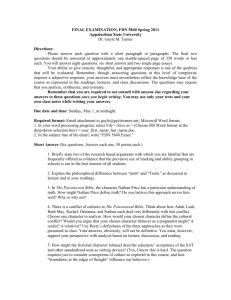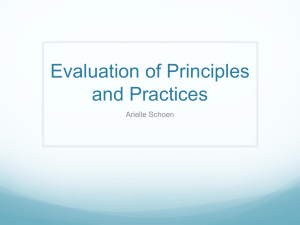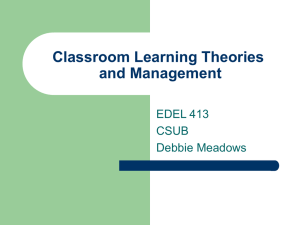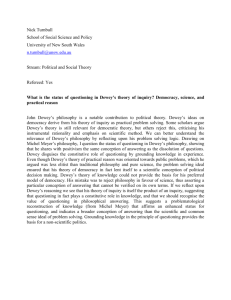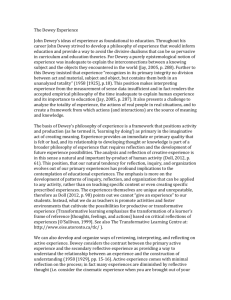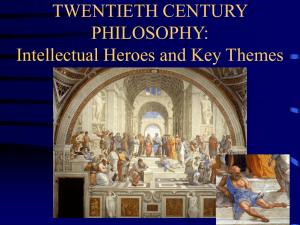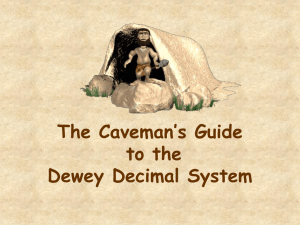voparil_rorty-dewey-fruitful-rev
advertisement
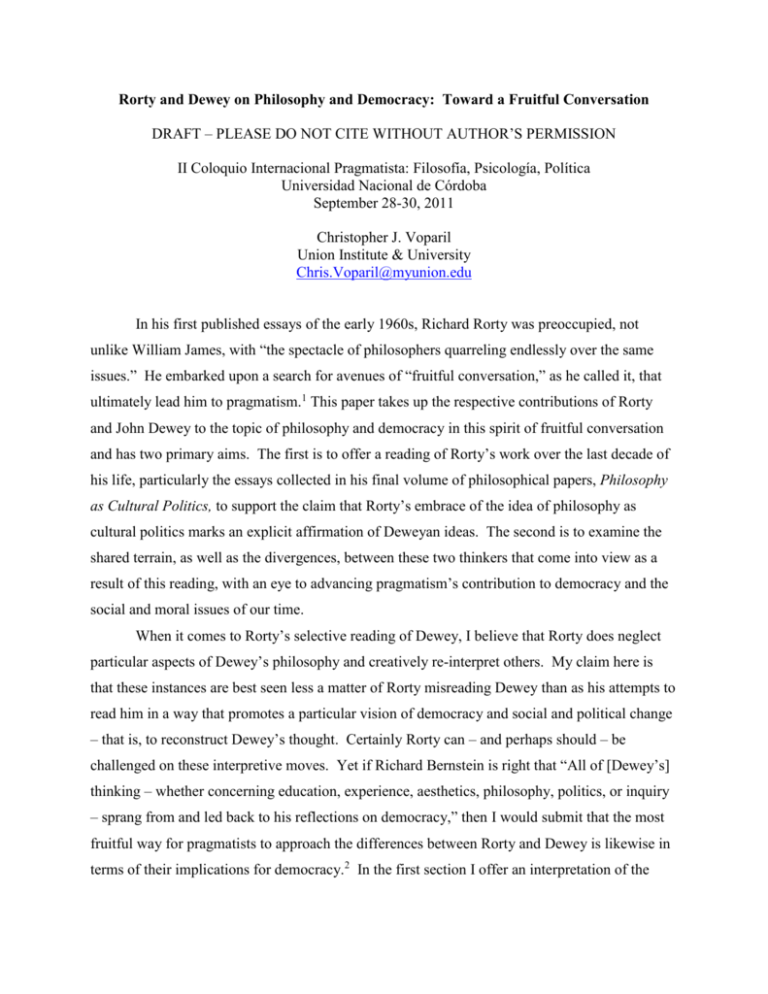
Rorty and Dewey on Philosophy and Democracy: Toward a Fruitful Conversation DRAFT – PLEASE DO NOT CITE WITHOUT AUTHOR’S PERMISSION II Coloquio Internacional Pragmatista: Filosofía, Psicología, Política Universidad Nacional de Córdoba September 28-30, 2011 Christopher J. Voparil Union Institute & University Chris.Voparil@myunion.edu In his first published essays of the early 1960s, Richard Rorty was preoccupied, not unlike William James, with “the spectacle of philosophers quarreling endlessly over the same issues.” He embarked upon a search for avenues of “fruitful conversation,” as he called it, that ultimately lead him to pragmatism.1 This paper takes up the respective contributions of Rorty and John Dewey to the topic of philosophy and democracy in this spirit of fruitful conversation and has two primary aims. The first is to offer a reading of Rorty’s work over the last decade of his life, particularly the essays collected in his final volume of philosophical papers, Philosophy as Cultural Politics, to support the claim that Rorty’s embrace of the idea of philosophy as cultural politics marks an explicit affirmation of Deweyan ideas. The second is to examine the shared terrain, as well as the divergences, between these two thinkers that come into view as a result of this reading, with an eye to advancing pragmatism’s contribution to democracy and the social and moral issues of our time. When it comes to Rorty’s selective reading of Dewey, I believe that Rorty does neglect particular aspects of Dewey’s philosophy and creatively re-interpret others. My claim here is that these instances are best seen less a matter of Rorty misreading Dewey than as his attempts to read him in a way that promotes a particular vision of democracy and social and political change – that is, to reconstruct Dewey’s thought. Certainly Rorty can – and perhaps should – be challenged on these interpretive moves. Yet if Richard Bernstein is right that “All of [Dewey’s] thinking – whether concerning education, experience, aesthetics, philosophy, politics, or inquiry – sprang from and led back to his reflections on democracy,” then I would submit that the most fruitful way for pragmatists to approach the differences between Rorty and Dewey is likewise in terms of their implications for democracy.2 In the first section I offer an interpretation of the 2 scholarship on Rorty’s relation to Dewey as a way to situate my reading here. The second section gives my own account of Rorty’s selective reading of Dewey and outlines two areas of common ground. The last section attempts to engage their respective stances in greater depth to better understand the role of pragmatist philosophy in relation to democratic politics. I. Interpreting Rorty’s Dewey Three broad waves or phases of Rorty-Dewey interpretation can be identified. The first wave was a response to Rorty’s essays on Dewey in the mid-1970’s, including “Overcoming the Tradition” and “Dewey’s Metaphysics,” later reissued in Consequences of Pragmatism (1982), and his claims about Dewey in Philosophy and the Mirror of Nature (1979). A primary focus of these initial essays, which include work by Thomas Alexander, Richard Bernstein, Garry Brodsky, James Campbell, Abraham Edel, Konstantin Kolenda, Ralph Sleeper, and others, was responding to Rorty’s claims to a Deweyan heritage and assaying the accuracy of his particular interpretation of Dewey’s work, with special attention to Dewey’s understanding of philosophy and its importance to his larger project.3 With few exceptions, Rorty’s interpretation of Dewey was found to be, at best, a “selective reading,” and, more often, to have “misread” and/or “fail[ed] to comprehend the basic thrust of Dewey’s thought.”4 A second wave of interpretation in the 1990s was sparked by the explicit turn to political concerns in Rorty’s Contingency, Irony, and Solidarity (1989) and the two volumes of philosophical papers from the 1980s published in 1991.5 Included here is work by Alexander, Bernstein, Jim Garrison, Larry Hickman, Richard Shusterman, and others, as well as a number of political theorists and philosophers of education who enter the conversation.6 The strength of this work resides in its awareness of the political consequences motivating Rorty’s stances, though in some cases the analysis amounts to re-recording of Rorty’s distance from Dewey, only now in more explicitly political terms. Only in the last few years has a third wave of interpretation emerged. The fact that the major fault lines already have been well-documented and defined seems to have freed this work to attend to the much less charted territory of shared ground between Dewey and Rorty. Indeed, what is striking about this recent work is the congenial spirit now taken toward the Rorty-Dewey relationship and the broader dialogue this approach has initiated. Noteworthy forays here 3 include work by the late Michael Eldridge, Colin Koopman, Alexander Kremer, Ken McClelland, and Mark Sanders, to name a few.7 From our current vantage, over three decades removed from the initial reception of Rorty’s use of Dewey, it seems to fair to say that the more alarmist worries that “Rorty threatens to undo Dewey’s work, rather than carry it forward” and that his readings “now threaten to affect the fortunes of the whole of American philosophy” can be set aside.8 Indeed, as Bernstein observes in his latest book, The Pragmatic Turn, “Today, the vigorous creative discussion of pragmatic themes by thinkers all over the world is more widespread than it has ever been in the past.”9 Still, the prediction of Brodsky back in 1982 that Rorty’s work on pragmatism “should initiate a new stage of creative and scholarly work on pragmatism and the several pragmatists” has not quite come to pass, at least not yet.10 My intention here is not to rehash the early debates around Rorty’s use and misuse of Dewey. On the contrary, my sense is that while not all of the claims in the first wave of commentary about Rorty’s own position hold up, when it comes to Rorty’s use of Dewey, these essays essentially get Rorty right. That is, through careful attention to Rorty’s various omissions, creative appropriations, and explicit rejections of particular elements of Dewey’s larger philosophical and political project, these essays offer a valuable ground-map for understanding Rorty’s reading of Dewey, in all its facets. The claim I want to make about the first wave, then, is not so much that it got Rorty wrong, but that by and large it missed Rorty’s point.11 What I mean by this is that neither the normative commitments that inform the judgments about Rorty, nor those driving Rorty’s own selective interpretations and moves, were made explicit and subjected to critical examination. As a result, not only did fruitful conversation fail to take place, the fundamental force of Rorty’s challenge went unfelt. This phenomenon of missing Rorty’s point continues in what I am calling the second wave of Rorty-Dewey interpretation.12 In many of these cases it is as if the mere fact of having departed from Dewey’s positions is enough to discredit Rorty’s perspective. Perhaps it is. But the fact that many of Rorty’s claims were rejected as misunderstandings or misinterpretations of Dewey, rather than engaged substantively, in my view, has hampered the development of pragmatism as a whole, particularly when it comes to clarifying philosophy’s role in relation to democratic politics.13 4 II. Rorty’s Deweyan Turn The overriding point of Rorty’s work, I submit, the fundamental motivation behind his thinking and writing, at least since the early 1970s, is a Deweyan one: promoting moral, cultural, and political change by reconceiving our understanding of philosophy and its role in the culture so that it better serves democratic politics. In attempting to initiate the kind of fruitful conversation between the work of Rorty and Dewey that I am calling for, I will focus on two particular commitments: the idea of philosophy as an instrument of social change, and an understanding of philosophy as cultural criticism as a way to bring about such change. As early as 1972 Rorty held that his primary concern was bringing about a “shift in perspective” that would enable us to see “the arts, the sciences, the sense of right and wrong, and the institutions of society” not as “attempts to embody or formulate truth or goodness or beauty,” but as “attempts to solve problems – to modify our beliefs and desires and activities in ways that will bring us greater happiness than we have now.”14 Without minimizing the differences between Dewey and Rorty, I would like to suggest that we examine the points of philosophical disagreement between the two thinkers in light of a commitment that they seemed to share – namely, a commitment to moral progress and social and political change. This approach at least helps us understand why Rorty interpreted Dewey in the selective way that he did. Rorty’s work of the 1970s, culminating in Philosophy and the Mirror of Nature, can be understood as an attempt to initiate a project of philosophical and cultural reconstruction aimed at getting us to move beyond “the entire cultural tradition which made truth […] a central virtue” (CP 35). As he put it in Mirror, he identified with thinkers, like Wittgenstein, Heidegger, and Dewey, who in his view sought “to help their readers, or society as a whole, break free from outworn vocabularies and attitudes, rather than to provide ‘grounding’ for the intuitions and customs of the present” (12). This same approach of evaluating philosophers based on the “politics” that follow from their perspectives is what leads Rorty to prefer Dewey over Heidegger, precisely for his efforts to turn philosophy toward rather than detach it from “the problems of men” (CP 52-3).15 It is this same foregrounding of social and political implications that is at work in Rorty’s selective interpretation of Dewey. In essays of the mid-1970s, like “Dewey’s Metaphysics” and “Professionalized Philosophy and Transcendentalist Culture,” Rorty makes clear his attraction to Dewey’s effort to make philosophy “an instrument of social change” and the possibility that 5 America’s “‘love of business’ might be transformed into a love of social reconstruction” (CP 74, 63). Indeed, in “Professionalized Philosophy,” he longs for “the years between the wars” when American philosophy, inspired by Dewey, “provided moral leadership for the country” (CP 63). Yet, at the same time, while clearly drawn to the notion of “philosophy-as-criticism-of-culture” he finds in Dewey, as the first wave of scholarship on Rorty’s use of Dewey establishes, Rorty proceeds to sever this idea of criticism of culture from the metaphysical and epistemological strands Dewey saw as necessary for this work (CP 75).16 As Rorty explains in “Dewey’s Metaphysics,” Dewey set out to show the harm which traditional philosophical dualisms were doing to our culture, and he thought that to do this job he needed a metaphysics – a description of the generic traits of existences that would solve (or dissolve) the traditional problems of philosophy, as well as open up new avenues for cultural development. I think that he was successful in this latter, larger, aim; he is one of the few philosophers of our century whose imagination was expansive enough to envisage a culture shaped along lines different from those we have developed in the West during the last three hundred years.17 Whether this is an accurate gloss on what Dewey was up to is of course an important question, and one that Dewey scholars in the first wave rightly took up.18 The larger questions raised here that I think the Rorty-Dewey literature has not given adequate attention are: what sort of role philosophy should play in the project of fostering cultural development, social reform, and moral progress, and what manner of conceiving philosophy is most conducive to this work? For his part, Rorty’s response to these questions evolved over time. Over the course of three decades, Rorty went from in the 1970s calling for and inviting, but being somewhat noncommittal about philosophy getting involved in cultural politics, to believing in the 1980s and 1990s that novelists, poets, and journalists alone can do the work, to thinking that the intervention of philosophers is absolutely necessary in his final collection of essays. Indeed, in the preface to Philosophy as Cultural Politics, Rorty encourages philosophers “to contribute to humanity’s ongoing conversation about what to do with itself,” invoking – and broadening – his call nearly three decades earlier in the final section of Mirror for “continuing the conversation of the West.” For philosophers to “intervene in cultural politics” means not just continuing the conversation but, importantly, “changing the course of the conversation” by suggesting new vocabularies and practices designed to make a pragmatic difference in the world. Citing 6 pragmatism’s potential for generating “radical cultural change,” Rorty calls cultural politics “the growing point of culture” and suggests, in a Deweyan spirit, that “philosophy professors” should see intervening in cultural politics as “their principal assignment.”19 Rorty’s call for philosophy professors to intervene in cultural politics marks a striking development in the thought of someone once regarded as heralding the end of philosophy. Yet the idea of “philosophy as cultural politics” that suddenly emerges in his final collection of essays is less of a departure than it initially seems. As I have started to demonstrate above, this later appeal to philosophy as cultural politics is of a piece with his call in essays of the mid1970s for philosophers to be more involved in the cause of “enlarging human freedom,” as he wrote in 1976, quoting Sidney Hook.20 Indeed, the most enduring commitment that can be discerned in Rorty’s writings to a positive role for philosophy is one that is remarkably Deweyan. This is the idea of philosophy as the criticism of culture. In 1982 Rorty described small “p” philosophy’s role after the outmoded vocabularies of the Plato-Kant tradition have been abandoned as the “study of the comparative advantages and disadvantages of the various ways of talking which our race has invented,” an approach he saw at the time as “much like what is sometimes called ‘culture criticism.’” Two decades later in a 2003 essay, he states: “I am content to see philosophy professors as practicing cultural politics,” which he explains in similar language as “suggesting changes in the uses of words and by putting new words into circulation – hoping thereby to break through impasses and to make conversation more fruitful.”21 In the interim, particularly in the group of essays from the mid-1990s that constitute the core of Philosophy and Social Hope, Rorty began to outline this positive role for philosophy, returning again to Dewey’s idea of “making philosophy an instrument of change” and to the function of philosophy as “mediat[ing] between old ways of speaking, developed to accomplish earlier tasks, with new ways of speaking, developed in response to new demands.”22 III. Reconstructed Philosophy and Creative Democracy My aim here is not to downplay the differences that exist in their respective perspectives, which in some cases are substantive and important. As pragmatists, I submit that we should evaluate these differences pragmatically, rather than by choosing sides. By this I mean informed by the pragmatist claim that “beliefs are rules for action, to be judged in terms of their effectiveness in resolving problems.”23 This approach does not dissolve the differences, but it 7 casts the debate in a different, more fruitful and forward-looking, light. I hope to promote careful examination and critical reflection on these differences with an eye to promoting the ends to which both Dewey and Rorty were passionately committed – namely, the causes of democracy, freedom, and justice. The idea of philosophy as cultural criticism offers one of the most fertile areas for further conversation. Even the first wave critics of Rorty recognized the shared territory here, though their focus was primarily on the points of divergence.24 Examples of Dewey’s effort to situate philosophy culturally abound in his texts.25 As we have seen, Rorty was attracted to the idea of “culture criticism” since the 1970s and in his final collection made his strongest case for the necessity of philosophers joining this effort.26 Both were deeply committed to the project of social, cultural, and moral reform, and both saw a role for philosophy to play in this project. And it is here that Rorty finds himself closest to Dewey, citing Dewey’s praise of democracy as the only “form of moral and social faith” that does not “rest upon the idea that experience must be subjected at some point or other to some form of external control; to some ‘authority’ alleged to exist outside the processes of experience.”27 However, when we examine more closely their respective understandings of philosophy’s particular role in this project, more intractable differences emerge. For Dewey, philosophy as the criticism of culture is inseparable from a naturalistic metaphysics, understood as “a statement of the generic traits manifested by existences of all kinds,” where social reform is promoted by generalizing “the experimental side of natural science into a logical method which is applicable to the interpretation and treatment of social phenomena” and philosophy serves as “a messenger, a liason officer, making reciprocally intelligible voices speaking provincial tongues, and thereby enlarging as well as rectifying meanings with which they are charged.”28 For Rorty, it involves not only contributing to but “changing the course” of “humanity’s ongoing conversation about what to do with itself” by suggesting new vocabularies, metaphors, and social practices, less through the application of method, than by “enlarging our repertoire of individual and cultural self-descriptions,” wherein the work of philosophy – “not to find out what anything is ‘really’ like, but to help us grow up – to make us happier, freer, and more flexible” – is not autonomous from art, literature, poetry, religion, science, and politics but “conversational” with them.29 To be sure, there are significant differences between Rorty and Dewey here.30 My point is that shifting our perspective to consider their positions from a pragmatic point of view that 8 examines the implications for democracy yields more fruitful ways of interpreting their philosophical differences. One of the places where Rorty seems furthest from Dewey, given the role of metaphysics for Dewey as “a statement of the generic traits manifested by existences of all kinds” that undergirds “intelligent inquiry” into social and political problems, is in his embrace of novels and narrative more generally as alternatives to “the attempt to theorize about human affairs.”31 Here philosophy as criticism is essential to Dewey’s conception of social reform, which he describes in Experience and Nature as “the liberation and expansion of the meanings of which experience is capable.”32 In “Creative Democracy,” Dewey reiterates the necessity for democracy of “generating the science which is the sole dependable authority for the direction of further experience and which releases emotions, needs and desires so as to call into being the things that have not existed in the past.”33 While Rorty would have agreed with the latter part of that sentence, his attention to the role that non-scientific and non-theoretical genres, like the novel, and to how pivotal forms of narrative knowledge have been to the struggle for democracy and social justice in the context of racial, ethnic, gender, and sexual exclusion, should give us pause about the claim that science is the “sole dependable authority” for the liberation of the meanings of which experience is capable. Indeed, the ways in which narrative and storytelling have been empowering for marginalized writers and have enabled the formation of communities should inform our conceptions of democratic collective self-reform.34 I say this not simply as a criticism of Dewey, for we know that he too was attuned to the ways in which “poetry is a criticism of life” and how “imaginative vision addressed to imaginative experience […] of possibilities that contrast with actual conditions” can promote social and political change by challenging the “consecrations of the status quo” that protect the established order.35 Writing in “Philosophy and Democracy” Dewey recognized that “different hues of philosophic thought are bound to result” from distinct social groups with different social and historical experiences. “When women,” he argues, “who are not mere students of other persons’ philosophy set out to write it, we cannot conceive that it will be the same in viewpoint or tenor as that composed from the standpoint of the different masculine experience of things.”36 What putting Rorty and Dewey into fruitful conversation helps us see is the tension between Dewey’s recognition that “every existence deserving the name of existence has something unique and irreplaceable about it, that it does not exist to illustrate a principle, to 9 realize a universal or to embody a kind of class,” and his notion that it is the business of philosophy “to gather up the threads into a central stream of tendency.”37 To be sure, Dewey himself seemed to recognize the limits and potential pitfalls of philosophy in relation to democracy. He called attention to “how largely philosophy has been committed to a metaphysics of feudalism” and “how thoroughly philosophy has been committed to a notion that inherently some realities are superior to others, are better to others.” Perceiving how the fact that philosophy “must proceed in an orderly way, logically” was a limitation, not unlike Rorty he contrasted it with “the art of literature,” which “catches men unaware and employs a charm to bring them to a spot whence they see vividly and intimately some picture which embodies life in a meaning.”38 In the context of these shared resonances and concerns, my sense is that Rorty’s conception of philosophy as criticism of culture is more attentive to the potential for even a more modest role for philosophy in gathering up the threads of new knowledge and perspectives into central tendency to exclude, overlook, and distort the range of meaning inherent in the diverse social experiences of different individuals and groups. Looking only to philosophical perspectives to collect this meaning – or even that it should be centrally collected at all – runs the risk of losing the experiences and shades of meaning that are nongeneralizable or not translatable to theoretical language or irreducibly other – precisely the sort of richness and diversity that that both Dewey’s and Rorty’s conceptions of democracy and moral progress need.39 In the end, Rorty’s notion that “the more philosophy interacts with other human activities – not just natural science, but art, literature, religion and politics as well – the more relevant to cultural politics it becomes, and thus the more useful,”40 strikes me as part of the project of realizing Dewey’s vision of the task of democracy: “the creation of a freer and more human experience in which all share to which all contribute.”41 In this context, Rorty thought that “cultural politics” should have “the last word,” so that “both monotheism and the kind of metaphysics or science that purports to tell you what the world is really like are replaced with democratic politics.”42 After reading Rorty and Dewey side by side, I can’t help but see this stance as informed by Dewey’s view of democracy as “belief in the ability of human experience” alone, without it being “subjected at some point or other to some form of external control; to some ‘authority’ alleged to exist outside the processes of experience,” to “generate the aims and 10 methods by which further experience will grow in ordered richness.”43 The task of clarifying the practical application of these insights now falls to us. ABBREVIATIONS Dewey EN LW MW RP Experience and Nature, 2nd ed. (New York: Dover Publications, 1958) The Later Works of John Dewey, 1925-1953, 17 Vols., ed. Jo Ann Boydston (Carbondale: Southern Illinois University Press, 1981-1990) The Middle Works of John Dewey, 1899-1924, 15 Vols., ed. Jo Ann Boydston (Carbondale: Southern Illinois University Press, 1976-1983) Reconstruction in Philosophy and Essays, 1920: The Middle Works, 1899-1924, Vol. 12, ed. Jo Ann Boydston (Carbondale: Southern Illinois University Press, 1982) Rorty AOC CP EHO ORT PCP PMN PSH TP Achieving Our Country: Leftist Thought in Twentieth-Century America (Cambridge: Harvard University Press, 1998) Consequences of Pragmatism: Essays 1972-1980 (Minneapolis: University of Minnesota Pres, 1982) Essays on Heidegger and Others: Philosophical Papers, Vol. 2 (New York: Cambridge University Press, 1991) Objectivity, Relativism, and Truth: Philosophical Papers, Vol. 1 (New York: Cambridge University Press, 1991) Philosophy as Cultural Politics: Philosophical Papers, Vol. 4 (New York: Cambridge University Press, 2007) Philosophy and the Mirror of Nature (Princeton: Princeton University Press, 1979) Philosophy and Social Hope (New York: Penguin Books, 1999) Truth and Progress: Philosophical Papers, Vol. 3 (New York: Cambridge University Press, 1998) NOTES Rorty, “Introduction,” The Linguistic Turn: Essays in Philosophical Method (Chicago: University of Chicago Press, 1967), p. 1. See also “Recent Metaphilosophy,” Review of Metaphysics 15, no. 2 (1961): 299-318; and “Realism, Categories, and the ‘Linguistic Turn,’” International Philosophical Quarterly 2, no. 2 (1962): 307-322. For a full account of Rorty’s early work and its connections to pragmatism see Christopher J. Voparil and Richard J. Bernstein (eds.), The Rorty Reader (Oxford: Wiley-Blackwell, 2010), General Introduction. 2 Richard J. Bernstein, “Creative Democracy—The Task Still Before Us,” in Sheila Greeve Davaney and Warren G. Frisina (eds.), The Pragmatic Century: Conversations with Richard Bernstein (Albany: SUNY Press, 2006), p. 191. 3 See Thomas Alexander, “Richard Rorty and Dewey’s Metaphysics of Experience,” Southwest Philosophical Studies 5 (1980): 24-35; Richard J. Bernstein, “Philosophy in the Conversation of Mankind,” Review of Metaphysics 33, no. 4 (1980): 745-775; Gary Brodsky, “Rorty’s Interpretation of Pragmatism,” Transactions of the Charles S. Peirce Society 17, no. 4 (1982): 311-338; James Campbell, “Rorty’s Use of Dewey,” Southern Journal of Philosophy 22, no. 2 (1984): 175-87; Abraham Edel, “A Missing Dimension in Rorty’s Use of Pragmatism,” Transactions of the Charles S. Peirce Society 21, no. 1 (1985): 21-38; James Gouinlock, “What is the Legacy of Instrumentalism? Rorty’s Interpretation of Dewey,” Journal of the History of Philosophy 28, no. 2 (1990): 251-269; Konstantin Kolenda, “Rorty’s Dewey,” Journal of Value Inquiry 20, no. 1 (1986): 84-95; Ralph Sleeper, “Rorty’s Pragmatism: Afloat in Neurath’s Boat, But Why Adrift?” Transactions of the Charles S. Peirce Society 21, no. 1 (1985): 9-20; and John Stuhr, “Dewey’s Reconstruction of Metaphysics,” Transactions of the Charles S. Peirce Society 28, no. 2 (1992): 161-176. 1 11 Campbell, “Rorty’s Use of Dewey,” p. 176; Sleeper, “Rorty’s Pragmatism,” p. 9; Alexander, “Richard Rorty and Dewey’s Metaphysics of Experience,” p. 33. 5 See ORT and EHO. 6 See Thomas M. Alexander, “John Dewey and the Moral Imagination: Beyond Putnam and Rorty Toward a Postmodern Ethics,” Transactions of the Charles S. Peirce Society 29, no. 3 (1993): 369-400; Richard J. Bernstein, “One Step Forward, Two Steps Backward: Richard Rorty on Liberal Democracy,” Political Theory 15, no. 4 (1987): 538-563; Raymond D. Boisvert, “Rorty, Dewey, and Post-Modern Metaphysics,” Southern Journal of Philosophy 27, no. 2 (1989): 173-193; Patrick J. Deneen, “The Politics of Hope: Rorty, Havel, and the Democratic Faith of John Dewey,” Social Research 66, no. 2 (1999): 577-609; Matthew Festenstein, “Pragmatism, Social Democracy, and Political Argument,” in Matthew Festenstein and Simon Thompson (eds.), Richard Rorty: Critical Dialogues (Cambridge: Polity Press, 2001), pp. 203-218; David Fott, “John Dewey and the Philosophical Foundations of Democracy,” Social Science Journal 28, no. 1 (1991): 29-44; Jim Garrison, “Rorty, Metaphysics, and the Education of Human Potential,” in Michael A. Peters and Paulo Ghiraldelli, Jr. (eds.), Richard Rorty: Education, Philosophy, and Politics (Lanham, MD: Rowman & Littlefield Press, 2001), pp. 47-66; Larry Hickman, “Liberal Irony and Social Reform,” in Philosophy and the Reconstruction of Culture: Pragmatic Essays After Dewey (Albany: State University of New York Press, 1993), pp. 223-239; Thelma Z. Lavine, “America and the Contestations of Modernity: Bentley, Dewey, Rorty,” in Herman J. Saatkamp, Jr. (ed.), Rorty and Pragmatism: The Philosopher Responds to His Critics (Nashville: Vanderbilt University Press, 1995), pp. 37-49; James D. Marshall, “On What We May Hope: Rorty on Dewey and Foucault,” Studies in Philosophy and Education 13 (1994): 307323; Alven Neiman, “Rorty’s Dewey: Pragmatism, Education, and the Public Sphere,” Studies in Philosophy and Education 15, no. 1/2: 21-29; Richard Shusterman, “Pragmatism and Liberalism between Dewey and Rorty,” Political Theory 22, no. 3 (1994): 391-413; Keith Topper, “Richard Rorty, Liberalism, and the Politics of Redescription,” American Political Science Review 89, no. 4 (1995): 945-975; and Kenneth Wain, “Strong Poets and Utopia: Rorty’s Liberalism, Dewey, and Democracy,” Political Studies 41 (1993): 394-407. 7 See Michael Eldridge, “Adjectival and Generic Pragmatism,” Human Affairs 19 (2009): 10-18; Colin Koopman, “Pragmatism as a Philosophy of Hope: Emerson, James, Dewey, Rorty,” Journal of Speculative Philosophy 20, no. 2 (2006): 106-116 and Pragmatism as Transition: Historicity and Hope in James, Dewey, and Rorty (New York: Columbia University Press, 2009); Alexander Kremer, “Dewey and Rorty,” Americana 3, no. 2 (2007): http://americanaejournal.hu/vol3no2/kremer ; and Ken McClelland, “John Dewey and Richard Rorty: Qualitative Starting Points,” Transactions of the Charles S. Peirce Society 44, no. 3 (2008): 412-445; and Mark Sanders, “Rortyan Hope,” Human Affairs 19 (2009): 52-59. 8 Gouinlock, “What is the Legacy of Instrumentalism?” p. 266; Joseph Margolis, “Richard Rorty: Philosophy By Other Means,” Metaphilosophy 31, no. 5 (2000), p. 535. 9 Richard J. Bernstein, The Pragmatic Turn (Cambridge: Polity Press, 2010), p. xi. 10 See Brodsky, “Rorty’s Interpretation of Pragmatism,” p. 333. 11 Bernstein, who has long been one of Rorty’s most astute readers and critics, calls attention to this possibility in “Philosophy in the Conversation of Mankind,” p. 760. For example, Alexander concludes that Rorty “totally ignores” certain key dimensions of Dewey’s metaphysics, without asking why Rorty might have eschewed them; Campbell recounts how Rorty replaces Dewey’s “vital elements” of criticism, evaluation, and work with edification, conversation, and play, without asking why Rorty may have made these moves and what he hoped to gain by them; Edel holds that Rorty “neglects” the centrality of “the concept of knowledge and its growth” in Dewey’s epistemology, without asking why Rorty performed this omission; Sleeper asserts that Rorty “fails to see” the importance of both metaphysics and epistemology in Dewey’s account and ignores Dewey’s logical writings, without asking what Rorty sought to gain by this selective reading. See Alexander, “Richard Rorty and Dewey’s Metaphysics of Experience,” p. 33; Campbell, “Rorty’s Use of Dewey,” p. 176; Edel, “A Missing Dimension,” pp. 30, 36; Sleeper, “Rorty’s Pragmatism,” pp. 15-16. 12 To cite only a few, Gouinlock aims to correct Rorty’s “serious misunderstandings of Dewey” without asking why Rorty may interpreted Dewey in the way that he did; Hickman attributes Rorty’s “mistakenly” interpreting Dewey as wanting to blur the distinctions among art, science, and philosophy to Rorty’s “confusion in this matter,” without probing why Rorty sought to find support for this position in Dewey; and Thelma Lavine concludes that Rorty leaves us “without the possibility of knowledge,” without asking why he made this move or what he sought to escape or enable through it. See Gouinlock, “What is the Legacy of Instrumentalism?” p. 72; Hickman, “Liberal Irony and Social Reform,” p. 225; Lavine, “America and the Contestations of Modernity,” p. 48. 13 If nothing else, as Brodsky observed, Rorty’s challenge has the potential to spur further reflection and rethinking. In some places this challenge sparks questions particular to analysis of Dewey. For instance, how might a lack of 4 12 mutually agreed-upon criteria impact Dewey’s notion of inquiry and program for social change? What are the strengths and weaknesses of Dewey’s attempt to reconcile Enlightenment and Counter-Enlightenment thought, and are there other possible paths for doing so? What is the relation of Dewey’s own views on the centrality of language to how we understand experience after the linguistic turn? In other places, Rorty’s challenge raises even broader questions of moment to anyone committed the project of creative democracy: what role might the arts play in addressing social, moral, and political problems, and how can this role be reconciled with an appeal to scientific method? What sorts of voices may be excluded by adhering to arguments that can be won or lost, rather than a notion of conversation? What are the limits of philosophy’s role in social reform, and what forms of experience might narrative bring to light that philosophy or theory may not? What are the virtues of interdisciplinarity and might these address some of the isolation of the philosophical profession from contemporary social and political problems diagnosed by both Dewey and Rorty? I do not mean to imply that questions like these have not and are not being considered, only to underscore directions in which pragmatist philosophers might more explicitly move, especially when it comes to examination of Rorty and Dewey, so that this work can be more fruitful for the future of pragmatism and democracy as a whole. 14 Rorty, “Keeping Philosophy Pure,” CP, p. 16. See Dewey, RP, p. 181. 15 See also the introduction to PMN, where Rorty further distinguishes Dewey from the other two heroes of that book, Heidegger and Wittgenstein, for situating his reading of the philosophical tradition “within a social perspective” and writing his critiques of that tradition “out of a vision of a new kind of society” (12-13). Later in AOC, Rorty cites the priority given to social justice in the work of Dewey (and Whitman) as the overriding factor in their ongoing relevance. See pp. 18, 36, 51, 101. 16 For an account that focuses on this issue, see Boisvert, “Rorty, Dewey, and Post-Modern Metaphysics.” 17 CP, p. 85. 18 For his part, as we know, Rorty took to calling his interpretation “a hypothetical Dewey,” which freed him to “describe what Dewey might have said, and in my view should have said, rather than what he did say.” See “Dewey Between Hegel and Darwin,” TP, p. 292. If nothing else, this approach offers a window in Rorty’s aims. See also Rorty’s later confession, “I may have gotten in the habit of construing Dewey in my own sense, and thus putting words in his mouth that he would have eschewed. This is a bad habit, and I regret if I have indulged it to the point of misleading the rising generation about what Dewey actually believed,” Rorty and Pragmatism, p. 52. 19 Rorty, PCP, pp. ix-x, 21. 20 CP, pp. 69-70. This line of interpretation would seem undermined by Rorty’s stance in Contingency, Irony, and Solidarity and essays of the late 1980s that the novel in particular and narrative in general should replace philosophy and theory as the primary vehicles of democratic transformation. Although I cannot provide a full account of Rorty’s development here, I would offer two points to help situate these apparent shifts in his thought. The first is that Rorty’s positions and claims are best interpreted in light of the social and political changes he hoped to bring about. In this sense, even if there are elements of his political vision we would like to critique, Rorty’s commitment to democracy did take priority over his commitment to philosophy, both as a discipline and a profession. That is, if it turns out that novels of moral protest, like those of Harriet Beecher Stowe, Charles Dickens, or James Baldwin, have done more to advance “the struggle for freedom and equality” than treatises of philosophy, as he seemed to believe, then he was prepared to accept this and advocate the use of novels as vehicles of moral reflection (see “Heidegger, Kundera, and Dickens,” in EHO, pp. 66-82). The second point is that Rorty never sought to do away with philosophy tout court, only a particular way of doing philosophy whose fundamental assumptions and subject matter had become impediments to projects of social and political reform and moral progress, as the final chapter of PMN makes clear. For my own view of the shortcomings of Rorty’s political theory, see my Richard Rorty: Politics and Vision (Lanham, MD: Rowman & Littlefield Press, 2006) and Voparil and Bernstein (eds.), The Rorty Reader, pp. 1-52. 21 CP, p. xl; PCP, p. 124. 22 PSH, pp. 29, 66. The essays I have in mind here are “Truth without Correspondence to Reality”; “A World without Substances or Essences,” and “Ethics Without Principles.” 23 Rorty, “Introduction” to LW 8, p. x. This brief essay itself is an important contribution to Rorty-Dewey interpretation. 24 See for example, Alexander, “Richard Rorty and Dewey’s Metaphysics of Experience,” pp. 29, 31-3; Campbell, “Rorty’s Use of Dewey,” pp. 177-8,181; and Boisvert, “Rorty, Dewey, and Post-Modern Metaphysics,” p. 190. 25 See, for instance: “philosophy, like politics, literature, and the plastic arts, is itself a phenomenon of human culture,” “Philosophy and Civilization,” in LW 3, p. 3; and esp. RP, including the Introduction to the 1948 reprint: “the distinctive office, problems, and subjectmatter of philosophy grow out of stresses and strains in the community 13 life in which a given form of philosophy arises, and that, accordingly, its specific problems vary with the changes in human life” and “no systematic efforts have as yet been made to subject the ‘morals’ underlying old institutional customs to scientific inquiry and criticism. Here, then, lies the reconstructive work to be done by philosophy,” LW 12, pp. 256, 266. See also: “An empirical philosophy is in any case a kind of intellectual disrobing. We cannot permanently divest ourselves of the intellectual habits we take on and wear when we assimilate the culture of our own time and place. But the intelligent furthering of culture demands that we take some of them off, that we inspect them critically to see what they are made of and what wearing them does to us,” EN, p. 37. Rorty offers a litany of quotes from Dewey on this issue in CP, p. 43. 26 See, for example, his discussion in “Professionalized Philosophy and Transcendentalist Culture” of “a kind of writing […] which is neither the evaluation of the relative merits of literary productions, nor intellectual history, nor moral philosophy, nor epistemology, nor social prophecy, but all these things mingled together into a new genre,” CP, p. 66. See also pp. xl, 61, 74, 85-87. For the more recent discussion, see PCP, pp. ix-x, 169, 171, and “Cultural Politics and the Question of the Existence of God,” pp. 3-26. 27 Dewey, “Creative Democracy,” LW 14, p. 229; qtd. in Rorty, PCP, p. 40. 28 EN, pp. 410-412; “Logic,” LW 8, p. 11. 29 PCP, pp. ix-x, 124. 30 For instance, Dewey would not have been likely to affirm Rorty’s claim that “the basic motive of pragmatism, like that of Hegelianism, was […] a continuation of the Romantic reaction to the Enlightenment’s sanctification of natural science,” EHO, p. 18. 31 Rorty, EHO, p. 73; Dewey, EN, pp. 412, 398. 32 EN, p. 411. 33 LW 14, p. 229. 34 See, for example, Jay Clayton, “The Narrative Turn in Minority Fiction,” American Literary History 2, no. 3 (1990): 375-393; and Winfried Fluck, “Fiction and Justice,” New Literary History 34, no. 1 (2003): 19-42. 35 Dewey, Art as Experience (New York: Perigee Books, 1980), pp. 346-48. 36 Dewey, MW 11, p. 45. 37 MW 11,pp. 52, 47. 38 MW 11, pp. 51, 46 39 For more on this issue, see Larry M. Preston, “Theorizing Difference: Voices from the Margins,” American Political Science Review 89, no. 4 (1995): 941-953; and Christopher J. Voparil, ““Rortyan Cultural Politics and the Problem of Speaking for Others.” Contemporary Pragmatism, vol. 8, no. 1 (2011), forthcoming. 40 PCP, p. x. 41 LW 14, p. 230. 42 PCP, pp. 14, 30-1. In Rorty’s view, “All attempts to name an authority which is superior to that of society are disguised move in the game of cultural politics. That is what they must be, because it is the only game in town,” PCP, p. 8. 43 LW 14, p. 229.
